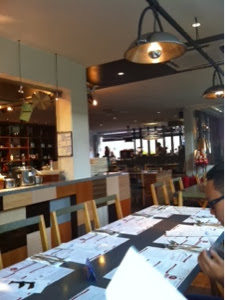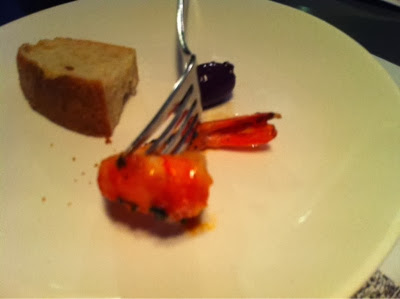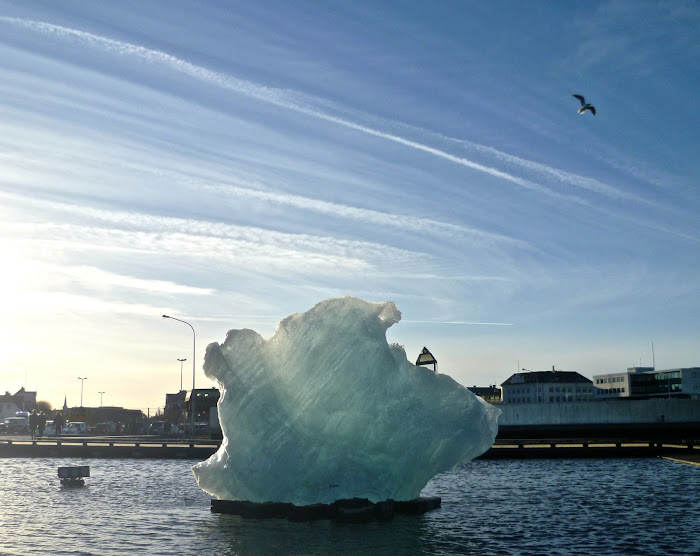I was walking through an U-Bahn station in Berlin last week and I saw a copy of "Jüdische Allgemeine" (you can translate it as "Jewish Weekly" if you like) on a completely regular subway newsstand. It's a far cry from the situation almost exactly 75 years ago in Germany, when on 9 November 1938 the state organised pogrom known as Reichskristallnacht took place. I don't think too many people are aware of the position (or even existence!) of the Jewish community in Germany today. The combination of this anniversary and my seeing that paper have therefore prompted this post.
Winding the Clock BackLet's wind the clock back, a little bit further than Reichskristallnacht, and go back 80 years, to 1933. The German Jewish community
stood at 505,000 at the time of the June 1933 census, a few months after the Nazis had come into power.
It's often not realised quite how small a percentage of the entire German population that the Jews made up: just 0.75%. That's not vastly different to the percentage of Jews in the UK today, which at 292,000 is estimated to be around
0.47% of the general population. In both cases, these are really small numbers and it's worth reflecting on that. The Nazis were obsessed with the "Jewish Question" and the influence of this tiny group of people on German society.
The German Jewish population in the years leading up to 1933 was small, then, but it was also highly integrated, generally secure and confident. It had been in Germany for 1600 years: the country has one of the longest and richest Jewish traditions and history in Europe. The traditional language of many European Jews was Yiddish: a High German dialect. Many American Jews of course still carry German surnames: the Morgensterns, Silberbergs and Rosenthals came from Germany, via Poland or Russia, and on to the US.
There's no doubt that when most people think of the words German and Jewish they inevitably start at the end, with the unique and murderous catastrophe of the holocaust. If you want a different perspective, I can highly recommend
Amos Elon's "The Pity of it All" which beautifully describes the 150 year history of the Jews in Germany from 1743 to 1933. Elon writes about a period of successful integration and individual achievement that produced a genuine Golden Age that peaked shortly before the coming to power of the Nazis. He does not see what came next as inevitable by any means, and rejects the view that the German anti-Semitism which began with Martin Luther's vicious Jew-hating tracts had to end up in Auschwitz. He convincingly sets out how the fate of Germany's Jews was uncertain until the end. It could have gone differently.
Reichskristallnacht Jews rapidly left Germany as the Nazis' grip on power intensified. The boycotts, racial laws and increased persecution led to a flood of people leaving. Over 300,000 left during the 30s, which meant that "only" around 36% of Germany's original Jewish population was eventually murdered in the holocaust. Other countries, such as the Netherlands, who were not able to flee in the same way because by then the War had started, suffered up to 90% murder rates of their Jewish populations.
A major impetus for German Jews' leaving the country was the pogrom of 9 November 1938. It's that anniversary that is approaching: 75 years ago. In August 1938 Germany had announced that all residence permits of foreigners would be cancelled. These included a sizeable number of Polish born Jews, who were faced with going back to Poland. Germany forcibly expelled 12,000 of them on 28 October 1938 and shipped them off to the border in one night. At the border, 8000 were refused entry to Poland. They were made to live in temporary camps in the bitter cold and rain in no-man's land.
 |
| 17 year old Herschel: an unlikely killer |
Two of the deportees were Sendel and Riva Grynszpan, whose 17 year old son, Herschel, was living in Paris. In desperation at their fate, on 7 November Herschel rang the bell of the German embassy to France. The person who answered the door was an aristocratic career diplomat, Ernst vom Rath, who happened to be under investigation by the Gestapo for his anti-Nazi sympathies. Herschel shot him repeatedly. On 9 November he died.
In response to the assassination, Goebbels sent out his famous message to all local Nazi party leaders from the Altes Rathaus in Munich that "the Führer has decided that... demonstrations should not be prepared or organized by the party, but insofar as they erupt spontaneously, they are not to be hampered." The message was clear that local party branches should attack German Jewish targets. They did so with a passion: over 1000 synagogues were burnt down across the country (many of them ancient, beautiful buildings), 7000 Jewish businesses were attacked, 91 Jews were beaten to death, and 30,000 were rounded up and sent to concentration camps (many temporarily). The foreign press looked on in horror: the Times wrote of attacks on defenceless, innocent people and the disgrace that had blackened Germany's name. It was a modern day, organised pogrom without equal.
 |
| The location of the former Heidelberg Synagogue |
The name "Kristallnacht" refers to the tonnes of smashed glass of the windows of synagogues and Jewish businesses. Across Germany today, from the largest city to the smallest town you will find plaques marking the location of the destroyed synagogues. In places like the pretty university town of Heidelberg the synagogue foundation stones have been preserved to preserve the indelible shame of that night. To add insult to injury, the German Jewish community was fined 1 Billion Reichsmark (£3.5 billion at today's prices, or £17,500 per person) for the clean-up operation. That night was what many historians regard as the beginning of the holocaust. The indescribably brutal fate of the six million is well-known.
Today's German Jewish CommunityImmediately after the War, it's a little known fact that many Jews from across Europe took refuge in Germany. This is perhaps counter-intuitive, but it's because the American and British occupied zones were safe havens where, unlike the hostility and sometimes violence that survivors faced when they returned home, they could pick up the fragments of their lives and plan their futures.
In Kielce, in Poland, for example, 42 Jewish holocaust survivors were stoned to death in a river on 4 July 1946, charged with the abduction of a Christian boy and medieval blood libel allegations. For the few surviving Polish Jews this was the end of their future in the country, and they moved to the protection of the Allies in Germany, before heading off to new lives in the US or Palestine.
The swell in Jewish numbers in Germany was therefore temporary. By 1989 the Jewish community of West Germany stood at around 30,000 - about 1/20th the size it had been in 1933. In East Germany there were only a few hundred: most took the rare opportunity of emigration to Israel in the 1970s when it was offered to them. Both communities were introspective, private, elderly and tended to be very private.
Then came Reunification in 1990, and the fall of the Soviet Union in 1992. Germany opened its doors to Jewish immigration from the East once more. In 2003 the Social Democratic chancellor, Schröder, signed an important and highly symbolic agreement with the German Jewish Central Council that placed Judaism on the same semi-established, elevated status as the Catholic and Lutheran Churches in Germany. Also in 2003, ten new rabbis were ordained in Berlin: the first since WW2. In 2006, the new rabbinical seminary in Potsdam ordained three reform rabbis: the first since 1942.
Russian Jews with Yiddish surnames, whose families had started off in the Rhineland, and who had moved eastwards in the early Middle Ages, started to come "home". The trickle became a flood. The renaissance in Jewish life as a result, right across Germany, has been remarkable. In a mere twenty years the Jewish population has grown around 300% to around 200,000. There are 120,000 active, practising members of the faith. Germany's is the fastest growing Jewish population in the world. There's an annual net emigration from Israel to Germany, mainly because Germany is seen as a much safer place to live. The irony of that fact is striking.
Synagogues are opening up across the country, not just in the major urban centres of Berlin and Munich. Hamelin, of Pied Piper fame, a small, sleepy town in northern central Germany, very close to where I grew up, has just opened the first new reform synagogue to be built in the country since well before the War. Its Jewish population in 1933 was 153 members. Now it stands at 200, which is the same level as at its heyday in 1880. The new synagogue is on the exact location of the one destroyed on 9 November 1938.
 |
| The Ohel Jakob "New Main Synagogue" in Munich |
The Jewish population of Munich is similarly back up at pre-Third Reich levels. I visited one of the synagogues there with Harriet, an English Orthodox friend, a few years back. She was blown away by the number of people attending on an ordinary Thursday night, and her reaction was a quiet and reflective "ultimately they didn't win, did they?" Remember, this was in Munich, the capital of the Nazi movement: Hitler's favourite city. I always take people to visit the magnificent New Synagogue there, which was opened on 9 November 2006. The roof represents the tents used during the biblical flight from Egypt, and also reminds us of the original Temple in Jerusalem. It is flooded with light inside.
Of course, not all is rosy. There are xenophobic and anti-Semitic far-right attacks in Germany, as elsewhere in the world. The difference is that here they automatically grab the world headlines, because people are so sensitive about them. Attacks on synagogues or Jewish graveyards in France, a worryingly regular occurrence, don't have the same press impact, so don't make the headlines in quite the same way as any in Germany might.
Long May It ContinueGermany now has the third largest Jewish community in Europe again (after France and the UK). Nothing can replace those who were murdered, or "make good" the harm of those 12 terrible years of the Third Reich. But the fact that Jews are once again choosing to live in Germany (after all, they
really don't have to) because it is considered a good, safe, stable place to bring up their children makes me, as a half-German, enormously proud.
This 9 November I shall, along with millions of others, reflect on the events of 75 years ago and what was to follow. I shall also think about the present and the future of Jews in Germany, and how positive things once again look. It is a testament to the efforts of politicians and ordinary people in the Federal Republic that we have reached this point. Long, long may it continue.



















































